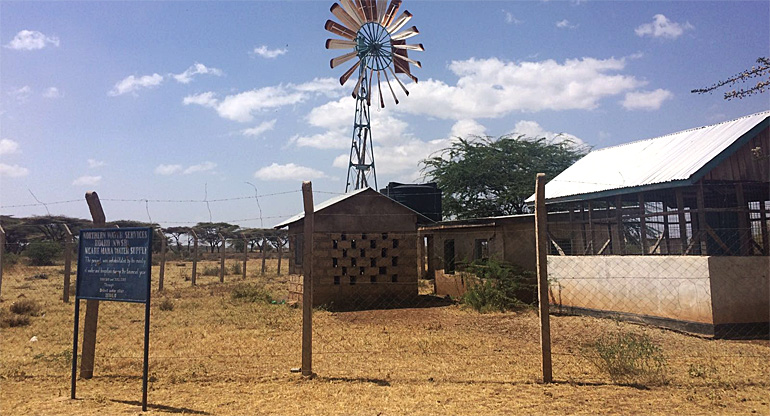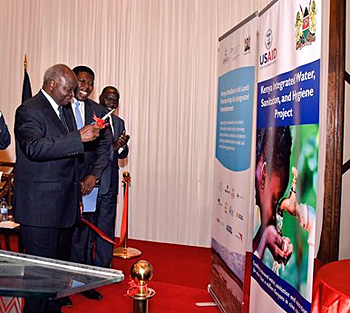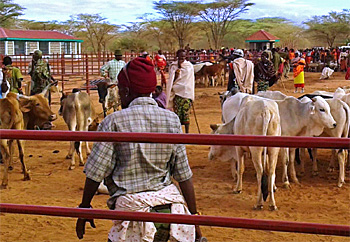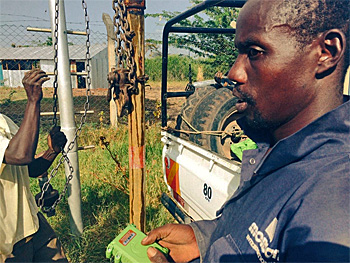MWA launches ambitious Kenya RAPID project for WASH facilities and healthy semi-arid rangelands
 Over the next five years the average water coverage rate in five northern counties of Kenya has to increase from 37 to more than 50 percent.
Over the next five years the average water coverage rate in five northern counties of Kenya has to increase from 37 to more than 50 percent.
Scalable business models for sustainable water supply and sanitation will be developed and some 450,000 families will gain access to drinking water and sanitation.
These are the ambitious goals of the Kenya Resilient Arid Lands Partnership for Integrated Development (Kenya Rapid) project that was officially launched by UN special envoy for water in Afrika, Mwai Kibaki, in Nairobi, Kenya, on 18 February.
Kenya Rapid is a public-private partnership lead by the Kenyan branch of the non-profit coalition of U.S. charities, Millennium Water Alliance (MWA).
 Kenya Rapid officially launched by former Kenyan president Mwai Kibaki.
Kenya Rapid officially launched by former Kenyan president Mwai Kibaki.
The project involves 14 partners, including local governments, four development agencies, and six private organisations of which three are Dutch: Acacia Water, Akvo and Aqua for All.
The project budget is 35.5 million US dollar of which 12.5 million is covered by US Aid, 7.5 million by Swiss SDC and 3 million by MWA. The remaining funding of 12.5 million will be contributed by private partners.
Restoration of healthy rangeland
The project is to end the drought emergencies in northern Kenya by improving the management of the rangelands, water, crops and to increase the livestock to boost the pastoral economy in this arid and semi-arid area.
The Dutch developed 3R concept to retain, recharge and reuse water, is an important element to be able to restore a healthy rangeland.
Consultancy firm Acacia Water will gather data on the landscape, water sources and water demand in a central database and will map the area. The database and the maps will form the basis for the strategies and measures to scale up the availability of fresh water.
Innovative is that the fresh water measures are linked to the availability of shallow and deep groundwater.
 The project addresses the specific needs of livestock and pastoralist communities.
The project addresses the specific needs of livestock and pastoralist communities.
Training the staff of the local counties
Knowledge transfer training on integrated water management to the staff of the project partners and local counties, are to ensure the proper application of the concepts of 3R and multiple use water services.
The essence of 3R is to better manage natural recharge and to retain water longer. In this manner unused runoff and evapotranspiration can be reduced.
The 3R concept is not so much about re-allocating scarce water, but to store water when it is plentiful and to make it available for dry periods.
The concept of multiple use water services takes people’s multiple water needs as a starting point, not in the building of new water facilities.
By planning for these multiple uses of water, many more benefits from investments in infrastructure can be realized: health, freedom from domestic chores, food and income and gender equity.
Data collection on water facilities
Amsterdam-based foundation Akvo is involved to monitor all the water facilities in the five counties.
Project partners will be trained to use the mobile phone-based Akvo Flow data collection system. Akvo Flow uses a special developed app for locals to file a questionnaire on their mobile phone on a water facility or bore hole.
The questionnaire is processed, together with photos and videos and sent online to a central database.
Akvo’s geo-location feature can easily show the exact location where the data was collected. This ensures a transparent monitoring and makes quick interventions possible.
 SweetSence supplies a sensor (green device) to remotely monitor the water flows at a bore hole.
SweetSence supplies a sensor (green device) to remotely monitor the water flows at a bore hole.
Not business as usual
The Kenya Rapid project is not about the usual development approach of country donors financing non-governmental organisations to build new water facilities. Instead the project builds on public-private partnerships that facilitate the counties to delivery water services.
Dutch foundation Aqua for All is involved as a broker to forge the public-private partnerships and to develop business cases for local SMEs.
An example of a successful participation is supplier SweetSence for remote sensors that monitor water pumps, latrines and water filters. It sensors are used to monitor the bore holes.
According to Marlies Batterink of Aqua for All new partners are still welcome. "The Kenya Rapid project seeks partners that like to invest in opportunities and solutions. We will assist potential partners to develop, pilot and roll out their ideas. The premises is for public-private investment on the basis of win-win", explains Batterink.
Read also on this website
● Akvo creates online water atlas for Benin. 8 February 2016
● IGRAC and Acacia mapped potential of Merti aquifer as reliable groundwater source for Kenya, 2 July 2015
● 3R partners to introduce water buffering measures in eco-village project in Igunga, Tanzania, 24 June 2015
● WWF7: Akvo Flow hits one million mark for field surveys, 18 April 2015
● IRC and Aqua for All to support Millennium Water Alliance in second phase Ethiopia WASH program, 13 October 2014
● Stockholm Water Week: Rainwater management crucial for eradication global poverty, 4 September 2014|
● Project: Kenya Arid Lands Disaster Risk Reduction - WASH Program
● Country: Kenya
More information
Aqua for All
The Hague, the Netherlands
+31 70 351 97 25
www.aquaforall.org
Acacia Water
Gouda, the Netherlands
+31 6 109 17 175
www.acaciawater.com
AKVO
Amsterdam, the Netherlands
+31 20 820 01 75
www.akvo.org
MWA Millennium Water Alliance
Washington, USA
+1 202 296-1832
www.mwawater.org



